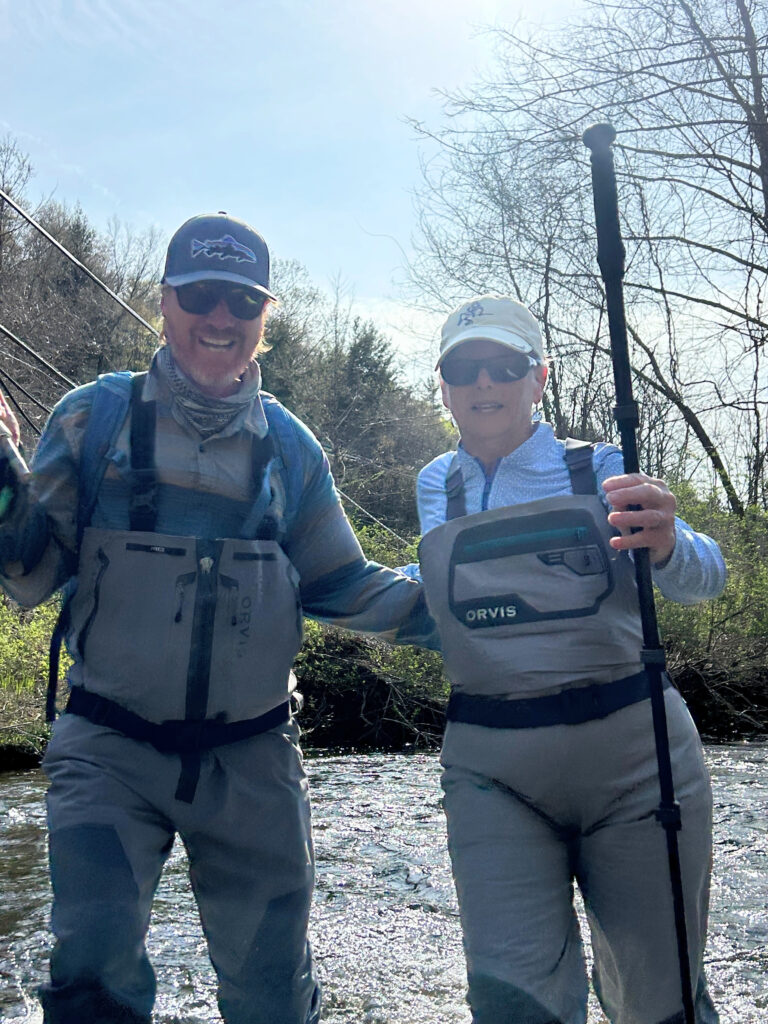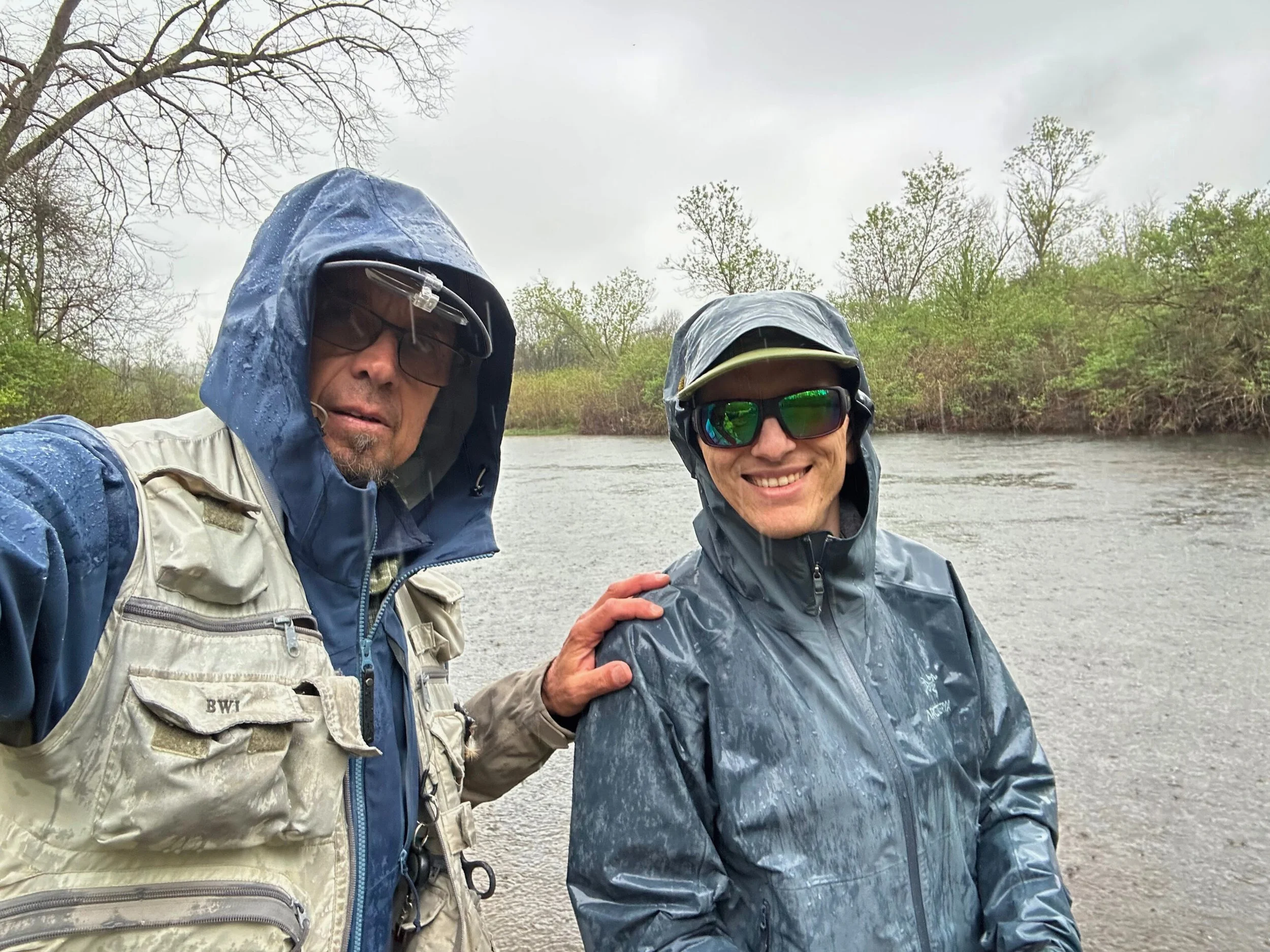Mastering Spring Fly Fishing on the Vermont Battenkill: Techniques, Challenges & Guide Tips

Spring fly fishing in Vermont, especially on iconic rivers like the Battenkill, presents both a rewarding challenge and a test of patience. With high water, unpredictable weather, and inconsistent hatches, anglers must adapt their techniques and mindset to make the most of the season.
For wade fishermen, either fishing solo or with a Vermont fly-fishing guide, the dream is often casting a dry fly to rising trout. However, spring conditions don’t always accommodate this ideal. Instead, anglers are left with two effective strategies for tackling the swollen rivers and finicky trout of early spring:
#1 Hunting for Trout on the Battenkill
Known for its wild brown and brook trout, the Battenkill flows through the scenic valleys near Manchester and Arlington, Vermont. High water often means scattered and elusive trout, with flows often pushing trout into less predictable lies. Spotting a rise can feel like finding a needle in a haystack. Patience and sharp observation become your greatest tools.
Armed with a pair of binoculars, take the time to study the banks and slower-moving pools of the river. Rising trout are rare, but when you do spot one, you’ll need to act quickly. Precision is critical—your dry fly must land in just the right spot to entice the fish and often requires a reach cast to keep you flies from being immediately swept downstream. This method is as much about strategy and timing as it is about skill, making every success that much more rewarding.

#2 Fishing Below the Surface with Streamers and Nymphs in High Water
When rises are scarce, fishing subsurface is often the most productive approach on the Battenkill and surrounding Vermont trout rivers. Both nymphs and streamers can yield results, though each requires a slightly different technique.
Personally, I prefer streamer fishing in high water. Streamers allow you to mimic baitfish, which trout often target in turbulent conditions. That said, streamer fishing demands strong casting skills to place the fly in productive zones, which can be a challenge for some anglers.
For those still developing their casting abilities, nymphing on the Battenkill offers an excellent alternative. A simple roll cast can deliver a nymph rig effectively, increasing the odds of hooking fish without requiring long or technical casts. Whether using streamers or nymphs, focus on presenting the fly naturally, as trout are less forgiving in fast-moving water.
Mindset and Wading Safety First

While catching fish is the ultimate goal, approaching high-water conditions with the right mindset is essential.
First and foremost, prioritize safety. High water can be treacherous, so assess each spot carefully before stepping in. Stick to slower eddies, shallow runs, and areas where the current allows for safe wading. You may also want to consider using a wading staff or stout stick to help provide added stability and confidence in these conditions.
Second, embrace the opportunity to observe and refine your skills. Spring fishing is often about quality over quantity—spotting a single rising trout or executing a perfectly placed cast can be as satisfying as landing a fish. If you’re on a guided fly-fishing trip in Vermont, use the time to work on casting techniques tailored to high-water conditions.
And if you’re curious about how high the Battenkill is at any given time, you can see river flows on waterdata.usgs.gov.
Closing Thoughts
Spring fly fishing for trout in Southern Vermont, and in particular the Battenkill, is a season of challenges and rewards. By adapting to the conditions, prioritizing safety, and honing your skills, you’ll find success even in the toughest circumstances. Whether you’re spotting a rising trout with binoculars or perfecting a roll cast with a nymph rig, the journey is as rewarding as the catch.

Plan Your Spring Fly Fishing Adventure on the Battenkill
Fly anglers from around the Northeast travel to Southern Vermont each year to fish and celebrate the Battenkill. From its deep history to its challenging wild trout, the Battenkill offers a fly fishing experience unlike any other in New England. And with towns like Manchester, VT offering great dining, lodging, and gear shops—this area is ideal for a weekend fly fishing getaway.
Booking a trip with a seasoned Vermont fly fishing guide can turn a tough spring day into an unforgettable learning experience. Whether you’re working on casting accuracy, reading water, or just learning where trout hold in high water, there’s no better classroom than the river.

